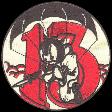
JAKE C DALTON

JAKE C DALTON
One very thank you to Jake Dalton to have agreed to answer my very numerous questions! For his kindness and its availability!
|
IN MEMORIAM |
|
It's with great sadness that I must inform you that Jake Dalton passed away this wednesday, May 4, 2016. Rest in Peace my friend. I will never forget you! Our exchanges daily amails will miss you very much! |
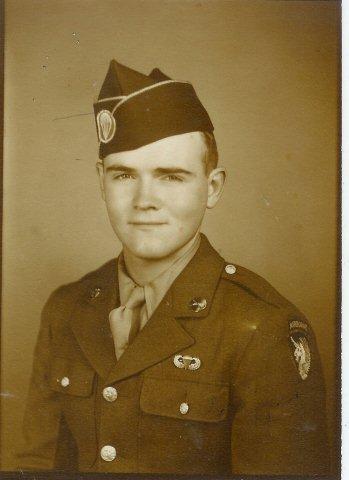 <= Jake Dalton in the 40's.
<= Jake Dalton in the 40's.
And today =>
Jake C Dalton was born in Rockwood, Texas on May 14th, 1925. The family had 4 children.
“I had 2 brothers and one sister - all younger than me. One brother died during WWII.”
In spite of the great depression, Jake had a happy childhood.
“The depression was very much a part of our lives as my father was a sharecropper in Oklahoma until we left there in 1937. After a stint in the shipyards during the war my father spent the rest of his life growing orchids in a greenhouse in Utah.”
Before his incorporation into the army, Jake was studying at the University of Colorado to become a Civil Engineer. in between High School and College, Jake spent a few months as welder in a shipyard of Portland, Oregon.
At 18, he is thus quite naturally called to serve his country. He was sent to the Army Induction Center of Fort Lewis, Washington.
“I became good friends with a draftee my own age, and after a few beers, we decided to join the paratroops - both for the excitement and the extra pay ( $50 ). My friend ( Joe Cooley ) and I were sent to the same unit and took our basic and airborne training in the same machine gun squad.”
In spite of a certain anxiety, his parents were very proud of him becoming a paratrooper. With 15 other new recruits, Jake Dalton is sent to Fort Benning, Georgia. There, the 513th Parachutes Infantry Regiment was created. Jake Dalton and his friend Joe volunteered for the machine gun squad of the 1st Battalion.
Then, after jump school, the 513th PIR is sent to Fort Bragg, North Carolina to follow the advanced training.
“At this time our TO was revised to include a Battalion Intelligence Section, and I was selected to be the NCO for this section, and now my real training began.”
Jake Dalton became Staff Sergeant of S-2 (Bn Intelligence Section of the HQ Company, 1st Battalion, 513th PIR.
As for his friend Joe Cooley, he remained with the machine gun platoon.
“Joe and most of our machine gun platoon was captured on our first major counter attack in the Bulge. We had 65 days of combat. Joe and I still communicate, and see each other occasionally - neither of us was seriously wounded.”
Jake Dalton thus went through a special advanced training, including some topography, the analysis of aerial photo and map as well as the construction of sand table which must be exposed to the various companies of the battalion.
“I never dreamed that in March, 1945 I would be constructing a sand table of our Bn drop zone in Germany (from aerial photos and existing Army maps).”
On August 20th, 1944, having participated in the great Tennessee manoeuvres, the 513th PIR and the whole division leave the United States for England.
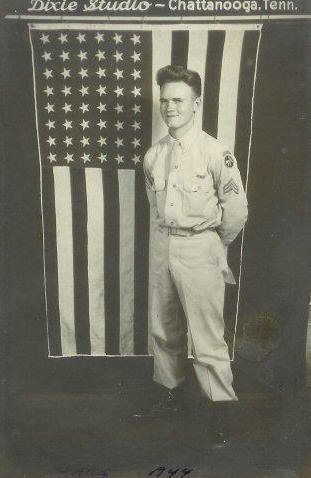
Jake Dalton was photographed during operations in Tennessee at a studio - 1944
Jake Dalton arrives to Liverpool by the end of August, 1944. He and his companions were sent to a tent city, Camp Chisledon. Later, they will have barracks.
“I visited England in 1976, and some of the WWII barracks were still standing in the open fields.”
In England, he pursued the training until December 20th when the division was sent on land to participate in the "Battle of the Bulge", in the Belgian Ardennes to push away the German offensive.
“I was lucky, and had quite a few weekend passes to London, and met an English WAAF in a movie theater during a V-2 bombing raid, and so had a steady girlfriend during my stay there. I also lucked out and was sent to an Army Intelligence School in London for a couple of weeks - we were billeted in the Savoy Hotel!!”
Once in France, Jake spent a night or two in a castle and one night or two in military camps. Then the Christmas night came.
“Our xmas meal was there, and we had a choice of whatever C ration we chose. I chose "pork and beans". On Xmas night my company commander (Capt. Cosner ) came to me with 6 Thompson sub machine guns, told me that I must distribute same to my men.”
“(I had 12 men in my S-2 Section at that time) I kept one and gave out the others to men who assured me that they had qualified with the Thompson. Luckily my section was in the top floor of the 2 story building. I had given one to Kurt Gabel (the author of a book that he wrote after the war "The Making Of A Paratrooper"), and I heard him insert a magazine and pull back the bolt. I yelled "you can't do that Gabel!! "”
“Too late - he released the bolt, but since he was in the top bunk the round went harmlessly thru the ceiling.”
“I had a good talk with Gabel and the rest of my section, was satisfied that each of us could handle the weapon, and let Gabel keep the Thompson. After the first day of combat some traded weapons with a wounded GI who had an M-1 because carrying enough ammo for a Thompson was a chore. As I recall, we had 4 or 5 20 round clips in our pockets.”
Next morning, Jake and his section were taken by truck a few miles from the front, in a small town called Neufchateau. Then, they walked up to the front line. All along the road, Jake remembers dead bodies, both GI and Germans.
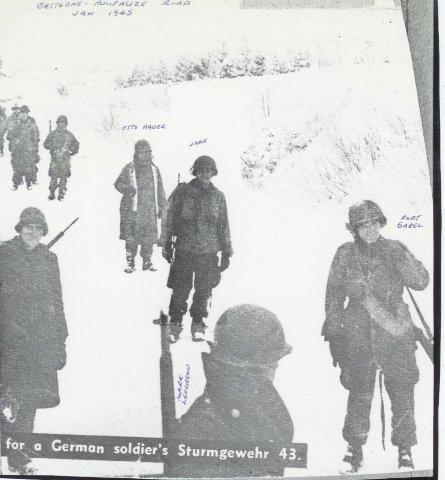
Jake Dalton and his section
during the Battle of the Bulge.
Jake is in the center of the photo, of front.
“When we arrived at what was to be our defence positions ( a forested area above " Dead Man's Ridge ") the German artillery fire began, and we were given our " baptism of fire ".
All I can remember about the weather is that it was cold - may have been snowing - when you're trying to dig a foxhole thru frozen ground, and hugging the ground when you hear incoming shells, the weather is not too important.”
Their main mission was to block the German advance and prepare to counter attack. The initial attack was scheduled for January 3rd or 4th. But for some reason ignored by Jake, it was postponed until January 7th. During this attack, the 513th PIR lost almost half its strengths.
“As I stated before, my best buddy, along with half our machine gun platoon and most of B and C companies were captured. These dates are not remembered the same by everybody.”
But, Jake Dalton was lucky, he was never injured and thus did not need any medical attention.
“There was a time when our battalion was the lead in an attack, and I was assigned to lead us single file along area where we were partially hidden by hedge rows. When we got to within about 50 yards of a road that was one of our objectives, I was given the word to step aside and await the Bn commander. The Sgt who was second in line behind me kept on walking towards the road, and when he reached the trees lining the road, he stepped on a mine. The man behind him stepped on another, and we lost 2 or 3 men in a hurry. Just another sign of how lucky I was!!”
After the "Battle of the Bulge", Jake Dalton and his comrades are sent to Luxembourg. Jake arrives at Wiltz where he can take his first hot shower and his first hot meal for a long time.
“We were issued clean clothing - longest time I‘ve ever spent in the same clothing with no bath. AIl this time in the Bulge, in the snow and cold, we still were wearing our issue boots, even though some units had received “snow packs’ footwear.”
To Wiltz, Jake Dalton and the men of the 513th were transported in a small town a few miles to the west of Oure River where, with the 507th PIR alternated in trying to cross the river. At that time, the Our River flood was due to the thaw.
“I had established an OP on a ridge above the river, and lost one KIA and one WIA to artillery fire. I lost half of one of my boot heels, but luckily the next day we got our “snow packs”!!”
Finally, the 507th and a battalion of the 513th crossed the river. A battalion pushed up to the Siegfried Line. During the next attack, his battalion advanced about 1500 yards when the battalion commander ordered to backtrack.
“One of our own artillery spotter planes saw this mass of men going the wrong way, thought we were Germans, and ordered a barrage. We lost more men to our artillery than we did in the attack. I can remember seeing the spotter plane at about 500 feet above me a minute or so before the shells started falling.”
Some time later, the 513th PIR is removed from the front and sent near Nancy, France to get more equipment and prepare to jump on the Rhine River.
“While regrouping and getting back in shape physically and mentally, we made a practice jump from C46 airplanes. All of our jumps prior to this were from C47s. The C47 had one door for entry and exit and that was on the left side of the plane.”
The jump from a C-46 was a little disturbing for men. Indeed, during their training, they learned to be well positioned to jump on the left! Here, the movement was to reverse. But the advantage of C-46 was to carry more people and to drop more quickly.
“If you were in the stick on the right side of the plane, you had to remember to do the opposite of what had become rote after about 15 practice jumps.”
A few weeks before Varsity, each Bn. S-2 were sent to an area, a tent city near an airport with everything needed to prepare the operation.
“My S - 2 job was to prepare a sand table of the Drop Zone assigned to the 1st Bn. To do this I was given an Army map with our DZ circled and several low and high altitude recon photos. We did this on a sheet of plywood with 6 or 8 inch sidewalls filled with about 4 inches of sand.
The tent in which we built the sand table was large enough so that we could get a couple of squads around it for a close look, and for any necessary explanation. ”
“One of the features that I remember pointing out was a power line that could be seen from the air on the way down, and would help immensely with orientation.
Guess what ? We were dropped about a mile NW of our D Z - so the sand table didn’t help much. Besides that, the flak and anti-aircraft fire made getting on the ground in any condition, anywhere, the number one priority!!”
“While we were in the marshalling area we heard that someone in the outfit had gone AWOL, gotten drunk and talked about our upcoming jump.
I don’t know if that is how it happened, but we do know that the Germans knew exactly when and where Varsity would happen, and they were waiting for us.”
On the morning of 24 March 1945 was a perfect day for jumping, clear skies, sunshine and perfect visibility.
“I mentioned before about the difference between jumping from a C47 and a C46. Naturally I was on the right (not correct) side of the plane, so had to remember to do things different.”
As usual, the battalion S-2, the officer was ahead of the stick.
“I was number 2 man in my stick, so as we stood up and hooked up, I could see the Rhine River below us and the puffs of flak that seemed below and all around the plane.
As we stood in the door, the plane was literally bouncing and bucking from flak and other anti-aircraft weaponry.”
Jake Dalton jumped after his officer. He landed within 5 yards of him. All around, 20mm shells exploded.
“After I got out of my chute the 20mms were still hitting the ground around me and I crawled over to my Lieutenant. who hadn’t moved.”
“He was on his back and covered with blood, so I zigzagged out of that corral, found a medic and pointed him in the right direction.”
He was his third officer. The first was promoted commander of A Company after the first attack during the Battle of the Bulge. The second was killed in action during the Battle of the Bulge. The 4th came after taking Munster.
Out of the 72 C-46 aircraft that carried the 513th PIR, 22 were destroyed.
“I think that most of the troopers got out in time. The pilots of those planes were real heroes.”
“Again, our objective was to clear our DZ of the enemy, so that the gliders would have a safe.”
“Since we were not in our DZ, we had to fight to get back to where we were supposed to be. Needless to say, some of the glider units had a rough time of it.”
“The smell of burning flesh as we neared some of the downed gliders is one that I’II never forgets.”
Jake Dalton also remembers a friend from his Battalion, an Operation Sergeant, a
few days before Varsity, had been drinking a few glasses and was crying while
saying he would not return alive. Jake found later, after the jump, his
parachute hung from a tree, Dead.
Once the area was cleaned and the units were assembled, the 17th Airborne and
allied forces began their advance into Germany. The 513th went fairly easy to do
Munster with British Tanks meeting light opposition.
“When our Battalion was the attack unit, we sometimes rode the tanks at night until we encountered opposition.
When we reached a stopping point, it was my job to set up observation posts, and man them until we were told to go again.”
Jake does not remember much of the fighting on the way to Munster, on the other hand, a fact is still very vivid in his memory.
“One of my most vivid memories occurred on Easter Sunday 1945.
We were strung out walking on the road somewhere between Haltern and Munster when a German plane, a Messerschmitt came from nowhere and strafed us.”
“Some of us plopped in the ditch on the west side of the road, and some of us got behind trees on the right side.”
“I ducked behind a tree on the right side of the road and saw one of our planes shoot him down as he started to make his turn for another run at us.
That was the only German plane that I saw during Varsity.”
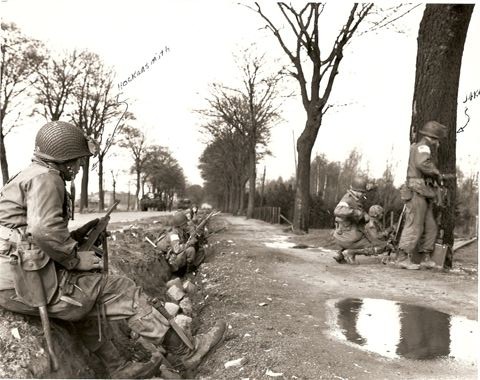
This photo was taken during the passage
of Messerschmitt which machine-gunned the road.
As says it Jake, he stands behind the tree.
In most cases, Jake was on duty at the observation posts at night, connecting the wires for communications with the commanding post of the battalion. It happened once that the observation post was located on a farm.
“When I took a Jeep out to check at daylight, I had to duck and run to get there as we were under fire from the retreating Germans.”
“We had walked to the farmhouse in the dark, and did not realize that there was still some enemy behind us”
Jake Dalton and his unit entered Munster, white flags made out of sheets were hanging at the windows. Once at the heart of the city, the unit underwent some sporadic gunfire. Jake participated in the cleaning of buildings that were more than rubble.
“Someplace near the center of town there was a bomb shelter, made of concrete, and it seems that it was nearly as large as a football field. Our company, or parts of it, including me, was given the job of checking ID’s of all the males in the shelter.”
“As I remember we did find a few German soldiers mixed in the crowd.”
After Munster, the 513th was sent to Duisburg in the Essen area to clean the Ruhr pocket and serve the occupation troupes on duty until August.
“My job was to meet with the burgermeister once a week, and with the D P camp commanders te syncronize orders for food and supplies for each camp. One of the camps was Russian, and on May 1, the commander reminded me that if was a big Russian holiday,and that they would have vodka,vodka,vodka.”
There was a Russian camp, a Polish and Czechs.
On 8 May 1945, the victory day, the company commander requisitioned schnaps in a
distillery.
Trucks were loaded and returned to the unit.
“Need I say that most of us will never drink green schnaps again!! ”
Shortly after 8 May, an officer had the idea to restore the exercises and training. There were new recruits to fill the holes left by the fighting. They needed training manuals. Jake Dalton was one of the lucky ones to go get the manuals in Nancy, at the base camp in France. He was accompanied by a 2nd Lieutenant in the battalion headquarters and two other combat veterans. They took advantage of the situation to have some great time in Liege. Shortly after being returned to Essen, Jake learned that each combat veteran was to be given a week paid vacation time. Destination choices were London, Paris or the Riviera.
“I chose the Rivierra. We were housed in a first class hotel, and furnished three meals a day for our entire stay. Nice life was not payed for! ”
“We were flown there in a C 47 and told to meet at the airport after seven days. We GI’s showed up ready to go back to Germany, but the pilot said something was wrong with the plane, and we wound up getting an extra three days- we knew the plane was ok!!”
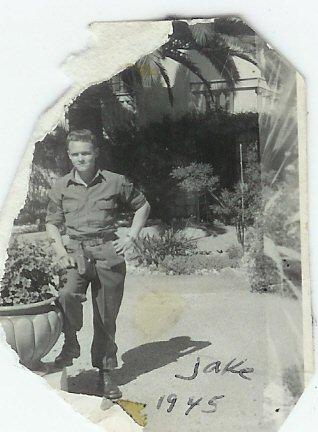
Jake Dalton photographed on Riviera in the South of France
Finally, Jake returns to his unit. In August 1945, the 17th was demobilized. Men who have not enough point are shared between other airborne divisions. Jake Daton meanwhile was assigned to the 517th PIR to be redeployed to the Pacific. The men were waiting to embark in Le Havre when an announcement was made that a bomb was dropped on Japan, followed by another and finally the capitulation of Japan. Jake Dalton therefore returned to the United States. He stayed another 4 months with the 517th PIR at Fort Bragg. He was assigned as Platoon Sergeant for the 81mm mortar.
“I was discharged on Dec 20 ,1945 ,and during the 4 months at Bragg waiting for the discharge.”
After the war, Jake Dalton enjoyed the GI Bill which allowed him to resume studies. He became "Land Surveyor.
“I had 2 semesters of Civil Engineering classes at Colorado University before I was drafted into the Army at age 18.
After the war I had 3 semesters at U C Berkeley from Feb. '46 to June '47.”
He worked for 36 years. His job was to surveyor the preliminary and final maps and layout work for property, construction and topographic surveys.
“After retiring from that, I worked for a travel agent as a tour director specializing in golf tours for 18 years. I retired completely at age 76, so for the past 8 years I have enjoyed golf and my family.”
Jake Dalton got married in 1947 and they had 3 boys and a girl. They now have 5 grand daughters and a great grand-son.
“We live in the San Francisco bay area of California.”
Jake Dalton also participates in the veteran’s organizations and meetings of the
17th Airborne Association.
This period, Jake Dalton still has his Ike Jacket.
“It doesn’t fit anymore. I have a knife and a Luger that I took off a German in the Bulge _ both of which I have given to my sons.”
Jake Dalton was awarded :
3 campaign ribbons (Ardennes, Rhineland, and Central Europe.), Paratrooper wings
with 3 arrows, Combat Infantry Badge, Combat Leader Bar, Bronze Star, and the
Belgian award: Military decoration for exceptional service or act of courage or
dedication, 2nd class.
Jake Dalton came back on the trail of history twice in 1974 and 1976.
“For three weeks in 1974 to France, Belgium, Luxemburg, and Germany, and in 1976 to England, Belgium, Holland, and Germany, but I have no plans to travel overseas again.”
From his experience of war, Jake keeps in mind two good memories:
“It was a 10 day furlough spent on the French Riviera - next best was a couple of weeks in an Intelligence School in London. We were billeted in the Savoy Hotel.”
During combat, Jake hated the Germans.
“But afterwards I realized that they were misled people, and most were as dedicated to their cause the same as we were. Actually, the as some people here were misled by George Bush and his invasion of Iraq.”
“I feel no rancor towards the German people.”
Jake Dalton in his home, 2009.
Jake Dalton with his Ike Jacket's he wore 12 May 2012 for the Castro Valley Parade.
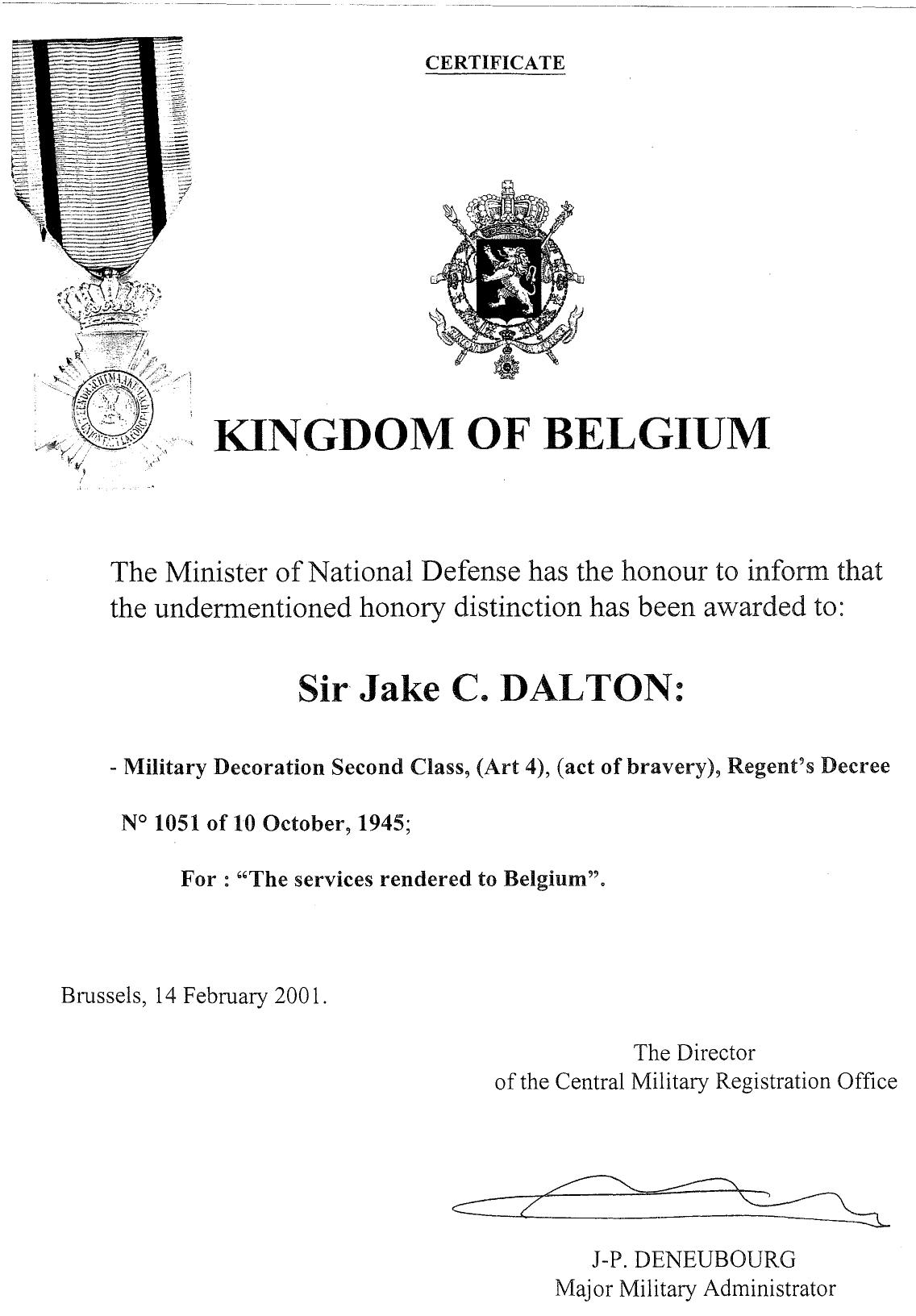
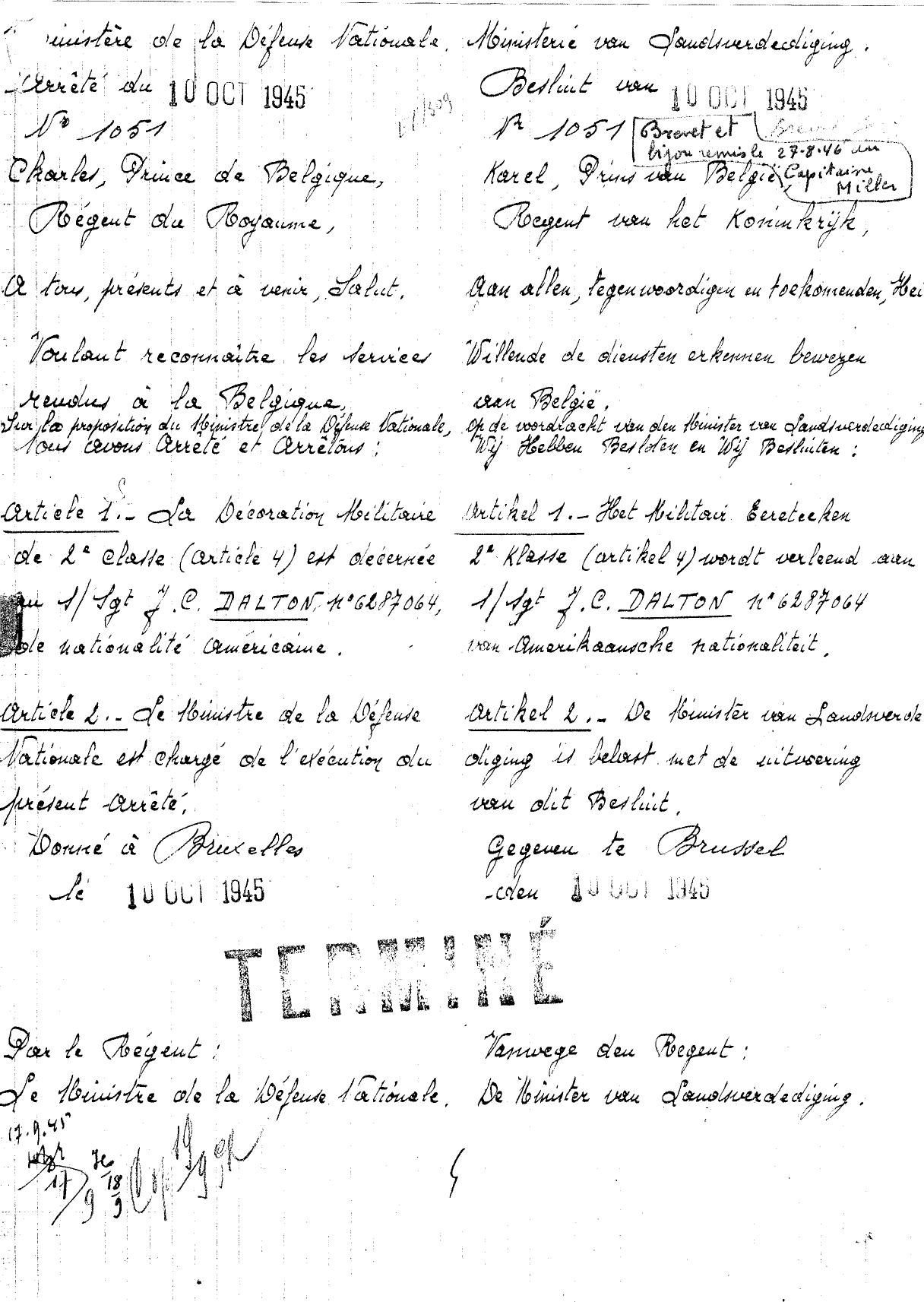
Jake Dalton received a special decoration of Belgium. This decoration was put back in number limited by unity. It belonged to the officers to choose who received it. And thus it is his officer who decided that he deserved it!